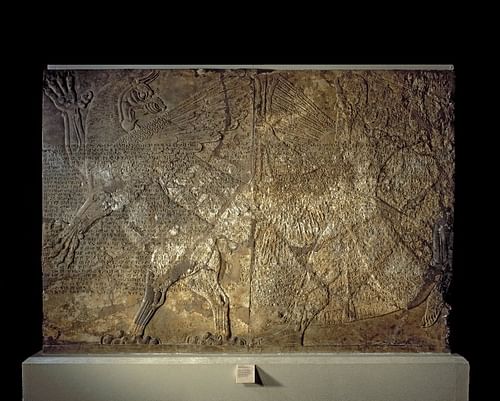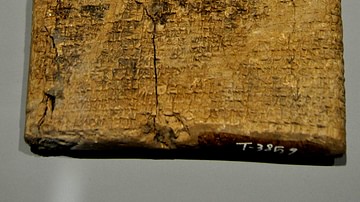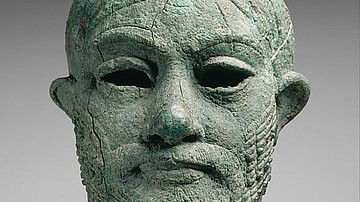Lugalbanda and the Anzud Bird is a Sumerian myth dated to the Ur III Period (2047-1750 BCE) featuring the hero-king of Uruk, Lugalbanda, father of Gilgamesh, in his younger years as an honorable officer in the army. Lugalbanda's purity of spirit and kindness to the great bird's offspring are emphasized as qualities befitting a future king.
The story is the final tale in the so-called Matter of Aratta concerning King Enmerkar of Uruk and his struggles with the ruler of the city of Aratta:
- Enmerkar and the Lord of Aratta
- Enmerkar and En-suhgir-ana
- Lugalbanda in the Mountain Cave
- Lugalbanda and the Anzud Bird
The work, also known as Lugalbanda and the Anzu Bird and Lugalbanda II, continues the story told in Lugalbanda in the Mountain Cave (also known as Lugalbanda I) of the brave warrior in Enmerkar's army who, through his piety and compassion, overcomes illness and other trials, befriends the magical bird of the mountains, and provides Enmerkar with victory over Aratta.
The works comprising the Matter of Aratta are considered pivotal in the development of Mesopotamian literature and the figure of Lugalbanda to resonate in the tales of his son Gilgamesh who struggles to become the kind of man and king his father was.
Summary & Commentary
In Lugalbanda in the Mountain Cave, Enmerkar is leading his troops against the city of Aratta when his commander, Lugalbanda, falls ill. Unable to continue, he is left behind in the mountains where, through his faith and prayers to the gods, he is healed. Lugalbanda and the Anzud Bird opens with the hero unable to tell where he is or how to rejoin his troops. He decides to seek help from the Anzud, the divine bird who lives in the mountains. The Anzud is so large and strong that the flapping of his wings brings on storms and is so fierce that his breath is fire.
Feeling he has no other choice, however, Lugalbanda searches for the bird's nest and finds it in poor condition and the Anzud's offspring hungry. He feeds the young bird and refurbishes the nest so that it looks "like a god's dwelling-place" (line 91). When the Anzud returns, he promises to "fix the fate" of whoever did him this kindness unasked. He tells Lugalbanda to wish for whatever he wants, and the hero asks for speed and stamina so he can move "like sunlight" wherever he wants to.
The bird grants him his wish and then accompanies him to find his troops, warning Lugalbanda not to tell anyone of his gift. The Anzud sees the army encamped and tells Lugalbanda how to find them before returning to his nest. When Lugalbanda rejoins the troops, he finds Enmerkar discouraged and about to withdraw from the siege of Aratta. The king needs assurance from the goddess Inanna that he is doing the right thing, but Inanna can only be consulted back in Uruk.
Lugalbanda volunteers to run back to the city and secure the blessings of the goddess, insisting that he go alone so he can use his new gift without anyone seeing. He races back to Uruk where Inanna tells him that Enmerkar must cut a tamarisk tree holy to her from the riverbank and catch a certain fish and sacrifice it to her, then he will have victory. The tablet breaks off after praising Lugalbanda, but it is assumed he delivered the message and that Aratta was successfully taken by Enmerkar.
Although literary compositions at this time usually concluded with praise for Nisaba, goddess of writing, this one ends by praising Lugalbanda. It is certainly possible the original tablet ended with the traditional praise for the goddess but also, owing to the divine status of Lugalbanda (who was later deified), concluded in this same way with praise for the future king – husband of the goddess Ninsun and father of the hero Gilgamesh – whose service to others in humility made him worthy, not only of kingship but also of divine veneration.
Text
The following passage comes from The Literature of Ancient Sumer, translated by Jeremy Black et al., and The Electronic Text Corpus of Sumerian Literature, translated by the same. Ellipses indicate missing lines or words. Kulaba was a district of Uruk (given here as Unug) before the two were joined as one city. Owing to space considerations, only lines 184 to conclusion are given here, beginning with the gift of the Anzud to Lugalbanda.
184-202. So Anzud says to holy Lugalbanda: "The power of running be in your thighs! Never grow tired! Strength be in your arms! Stretch your arms wide, may your arms never become weak! Moving like the sun, like Inanna, like the seven storms of Iškur, leap like a flame, blaze like lightning! Go wherever you look to, set foot wherever you cast your glance, reach wherever your heart desires, loosen your shoes in whatever place your heart has named to you! When Utu lets you reach Kulaba your city, he who curses you shall have no joy thereof; he who wishes to strive with you shall never say 'Just let him come!' When you have had the woodcarvers fashion statues of me, I shall be breathtaking to look upon. My name will be made famous thereby in Sumer and will redound to the credit of the temples of the great gods. May ... shake for you ... like a sandal. ... the Euphrates ... your feet ..."
203-219. He took in his hand such of his provisions as he had not eaten, and his weapons one by one. Anzud flew on high, Lugalbanda walked on the ground. The bird, looking from above, spies the troops. Lugalbanda, looking from below, spies the dust that the troops have stirred up. The bird says to Lugalbanda, "Come now, my Lugalbanda. I shall give you some advice: may my advice be heeded. I shall say words to you: bear them in mind. What I have told you, the fate I have fixed for you, do not tell it to your comrades, do not explain it to your brothers. Fair fortune may conceal foul: it is indeed so. Leave me to my nest: you keep to your troops." The bird hurried to his nest. Lugalbanda set out for the place where his brothers were.
220-237. Like a pelican emerging from the sacred reedbed, like laḫama deities going up from the abzu, like one who is stepping from heaven to earth, Lugalbanda stepped into the midst of his brothers' picked troops. His brothers chattered away; the troops chattered away. His brothers, his friends weary him with questions: "Come now, my Lugalbanda, here you are again! The troops had abandoned you as one killed in battle. Certainly, you were not eating the good fat of the herd! Certainly, you were not eating the sheepfold's fresh cheese. How is it that you have come back from the great mountains, where no one goes alone, whence no one returns to mankind?" Again, his brothers, his friends weary him with questions: "The banks of the mountain rivers, mothers of plenty, are widely separated. How did you cross their waters? – as if you were drinking them?"
238-250. Holy Lugalbanda replies to them, "The banks of the mountain rivers, mothers of plenty, are widely separated. With my legs I stepped over them, I drank them like water from a waterskin; and then I snarled like a wolf, I grazed the water-meadows, I pecked at the ground like a wild pigeon, I ate the mountain acorns." Lugalbanda's brothers and friends consider the words that he has said to them. Exactly as if they were small birds flocking together all day long, they embrace him and kiss him. As if he were a gamgam chick sitting in its nest, they feed him and give him drink. They drive away sickness from holy Lugalbanda.
251-283. Then the men of Unug followed them as one man; they wound their way through the hills like a snake over a grain-pile. When the city was only a double-hour distant, the armies of Unug and Kulaba encamped by the posts and ditches that surrounded Aratta. From the city it rained down javelins as if from the clouds, slingstones numerous as the raindrops falling in a whole year whizzed down loudly from Aratta's walls. The days passed, the months became long, the year turned full circle. A yellow harvest grew beneath the sky. They looked askance at the fields. Unease came over them. Slingstones numerous as the raindrops falling in a whole year landed on the road. They were hemmed in by the barrier of mountain thornbushes thronged with dragons. No one knew how to go back to the city, no was rushing to go back to Kulaba. In their midst Enmerkar son of Utu was afraid, was troubled, was disturbed by this upset. He sought someone whom he could send back to the city, he sought someone whom he could send back to Kulaba. No one said to him "I will go to the city." No one said to him "I will go to Kulaba." He went out to the foreign host. No one said to him "I will go to the city." No one said to him "I will go to Kulaba." He stood before the élite troops. No one said to him "I will go to the city." No one said to him "I will go to Kulaba." A second time he went out to the foreign host. No one said to him "I will go to the city." No one said to him "I will go to Kulaba." He stepped out before the élite troops.
284-289. Lugalbanda alone arose from the people and said to him, "My king, I will go to the city, but no one shall go with me. I will go alone to Kulaba. No one shall go with me." – "If you go to the city, no one shall go with you. You shall go alone to Kulaba, no one shall go with you." He swore by heaven and by earth: "Swear that you will not let go from your hands the great emblems of Kulaba."
290-321. After he had stood before the summoned assembly, within the palace that rests on earth like a great mountain Enmerkar son of Utu berated Inanna: "Once upon a time my princely sister holy Inanna summoned me in her holy heart from the bright mountains, had me enter brick-built Kulaba. Where there was a marsh then in Unug, it was full of water. Where there was any dry land, Euphrates poplars grew there. Where there were reed thickets, old reeds and young reeds grew there. Divine Enki who is king in Eridu tore up for me the old reeds, drained off the water completely. For fifty years I built, for fifty years I was successful. Then the Martu peoples, who know no agriculture, arose in all Sumer and Akkad. But the wall of Unug extended out across the desert like a bird net. Yet now, here in this place, my attractiveness to her has dwindled. My troops are bound to me as a cow is bound to its calf; but like a son who, hating his mother, leaves his city, my princely sister holy Inanna has run away from me back to brick-built Kulaba. If she loves her city and hates me, why does she bind the city to me? If she hates the city and yet loves me, why does she bind me to the city? If the mistress removes herself from me to her holy chamber, and abandons me like an Anzud chick, then may she at least bring me home to brick-built Kulaba: on that day my spear shall be laid aside. On that day she may shatter my shield. Speak thus to my princely sister, holy Inanna."
322-344. Thereupon holy Lugalbanda came forth from the palace. Although his brothers and his comrades barked at him as at a foreign dog trying to join a pack of dogs, he stepped proudly forward like a foreign wild ass trying to join a herd of wild asses. "Send someone else to Unug for the lord." – "For Enmerkar son of Utu I shall go alone to Kulaba. No one shall go with me" – how he spoke to them! "Why will you go alone and keep company with no one on the journey? If our beneficent spirit does not stand by you there, if our good protective deity does not go with you there, you will never again stand with us where we stand, you will never again dwell with us where we dwell, you will never again set your feet on the ground where our feet are. You will not come back from the great mountains, where no one goes alone, whence no one returns to mankind!" – "Time is passing, I know. None of you is going with me over the great earth." While the hearts of his brothers beat loudly, while the hearts of his comrades sank, Lugalbanda took in his hand such of his provisions as he had not eaten, and each of his weapons one by one. From the foot of the mountains, through the high mountains, into the flat land, from the edge of Anšan to the top of Anšan, he crossed five, six, seven mountains.
345-356. By midnight, but before they had brought the offering-table to holy Inanna, he set foot joyfully in brick-built Kulaba. His lady, holy Inanna, sat there on her cushion. He bowed and prostrated himself on the ground. With (1 ms. adds:) joyful eyes Inanna looked at holy Lugalbanda as she would look at the shepherd Ama-ušumgal-ana. In a joyful voice, Inanna spoke to holy Lugalbanda as she would speak to her son Lord Šara: "Come now, my Lugalbanda, why do you bring news from the city? How have you come here alone from Aratta?"
357-387. Holy Lugalbanda answered her: "What Enmerkar son of Utu quoth and what he says, what your brother quoth and what he says, is: 'Once upon a time my princely sister holy Inanna summoned me in her holy heart from the mountains, had me enter brick-built Kulaba. Where there was a marsh then in Unug, it was full of water. Where there was any dry land, Euphrates poplars grew there. Where there were reed thickets, old reeds and young reeds grew there. Divine Enki who is king in Eridu tore up for me the old reeds, drained off the water completely. For fifty years I built, for fifty years I was successful. Then the Martu peoples, who know no agriculture, arose in all Sumer and Akkad. But the wall of Unug extended out across the desert like a bird net. Yet now, here in this place, my attractiveness to her has dwindled. My troops are bound to me as a cow is bound to its calf; but like a son who, hating his mother, leaves his city, my princely sister holy Inanna has run away from me back to brick-built Kulaba. If she loves her city and hates me, why does she bind the city to me? If she hates the city and yet loves me, why does she bind me to the city? If the mistress removes herself from me to her holy chamber and abandons me like an Anzud chick, then may she at least bring me home to brick-built Kulaba: on that day my spear shall be laid aside. On that day she may shatter my shield. Speak thus to my princely sister, holy Inanna.'"
388-398. Holy Inanna uttered this response: "Now, at the end, on the banks, in the water-meadows, of a clear river, of a river of clear water, of the river which is Inanna's gleaming waterskin, the suḫurmaš fish eats the honey-herb; the toad eats the mountain acorns; and the ... fish, which is a god of the suḫurmaš fish, plays happily there and darts about. With his scaly tail he touches the old reeds in that holy place. The tamarisks of the place, as many as there are, drink water from that pool."
399-408. "It stands alone, it stands alone! One tamarisk stands alone at the side! When Enmerkar son of Utu has cut that tamarisk and has fashioned it into a bucket, he must tear up the old reeds in that holy place roots and all and collect them in his hands. When he has chased out from it the ... fish, which is a god of the suḫurmaš fish, caught that fish, cooked it, garnished it and brought it as a sacrifice to the a-an-kar weapon, Inanna's battle-strength, then his troops will have success for him; then he will have brought to an end that which in the subterranean waters provides the life-strength of Aratta."
409-412. "If he carries off from the city its worked metal and smiths, if he carries off its worked stones and its stonemasons, if he renews the city and settles it, all the moulds of Aratta will be his."
413-416. Now Aratta's battlements are of green lapis lazuli, its walls and its towering brickwork are bright red, their brick clay is made of tinstone dug out in the mountains where the cypress grows.
417. Praise be to holy Lugalbanda.






